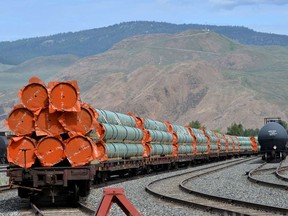Trans Mountain pipeline sees improved fortunes following the cancellation of the Keystone XL project.
The Expansion Takes on Greater Importance for the Oil Sector
WINNIPEG/OTTAWA — The expansion of Canada’s government-owned Trans Mountain pipeline assumes greater importance for the oil sector after the cancellation of rival Keystone XL reduced future options to carry crude, potential buyers say.
Background on the Pipeline Expansion
Trans Mountain Corp, a government corporation, is spending $12.6 billion to nearly triple capacity to 890,000 barrels per day (bpd), a 14 per cent increase from current total Canadian capacity. This significant expansion will enable Canada to meet growing demand for crude and provide a vital link between Alberta’s oil reserves and the British Columbia coast.
The Role of Trans Mountain in the Oil Sector
Prime Minister Justin Trudeau’s government bought the 68-year-old pipeline in 2018 when previous owner Kinder Morgan faced legal hurdles to expand the 1,150-kilometre (715-mile) line. Ottawa has always said it would find new owners.
Impact of Keystone XL Cancellation on Trans Mountain
The cancellation of Keystone XL has reduced future options for crude transportation, making the expansion of Trans Mountain even more crucial. Canadian companies have long struggled to secure top prices for their crude due to pipeline congestion and forced sales at a discount. However, with advancing pipeline expansions and reduced fuel demand due to pandemic travel lockdowns, Canada may have surplus export pipeline capacity once TMX enters service.
Commitments from Shippers and Companies
Suncor Energy Inc, Canadian Natural Resources Ltd, and BP PLC are among the committed shippers who have secured 80 per cent of its additional capacity long-term. This significant commitment demonstrates confidence in the project’s viability and highlights the importance of Trans Mountain for Canada’s oil industry.
Potential Buyers Interested in TMX
Project Reconciliation, a First Nations coalition, hopes to buy 51 per cent this year. Sharing Trans Mountain’s profits would help improve living conditions on First Nations, said Delbert Wapass, executive chair. Canadian companies have long struggled to secure top price for their crude as pipeline congestion forced them to sell at a discount.
Government Plans for TMX
Ottawa plans to sell the pipeline once there are fewer risks to completion and consultations wrap up with First Nations, said Finance Ministry spokeswoman Katherine Cuplinskas. The government bought Trans Mountain for its strategic importance, enabling shippers to move oil to Asia, as well as the United States, which buys most Canadian crude.
Enbridge Inc’s Opportunity
The cancellation of Keystone XL also benefits Enbridge Inc, which runs North America’s Mainline oil network. It intends to sell long-term contracts for most of the Mainline’s capacity, pending regulator approval, rather than continue to ration it on the spot market.
Conclusion
Trans Mountain pipeline expansion assumes greater importance after the cancellation of Keystone XL reduced future options for crude transportation. Canadian companies have long struggled to secure top prices for their crude due to pipeline congestion and forced sales at a discount. The expansion will provide a vital link between Alberta’s oil reserves and the British Columbia coast, meeting growing demand for crude.
Sources
- Thomson Reuters 2021
- Tudor Pickering Holt
- Project Reconciliation
Note: This article is based on the original content provided by Thomson Reuters in 2021. The information has been reorganized and reformatted to fit the requested format while maintaining the original content’s integrity.




